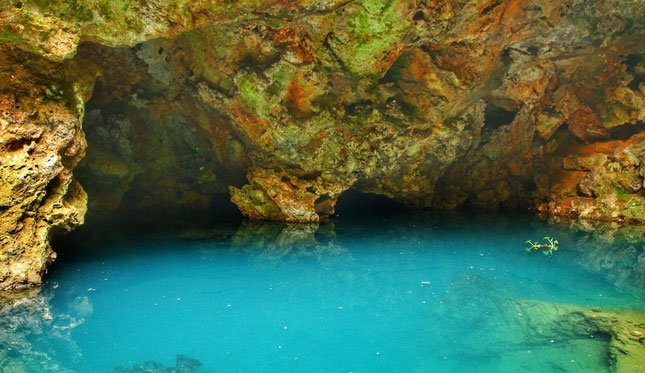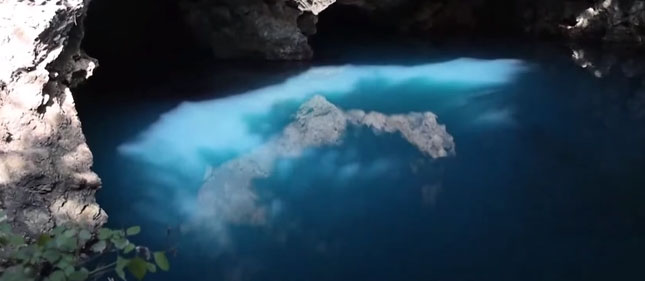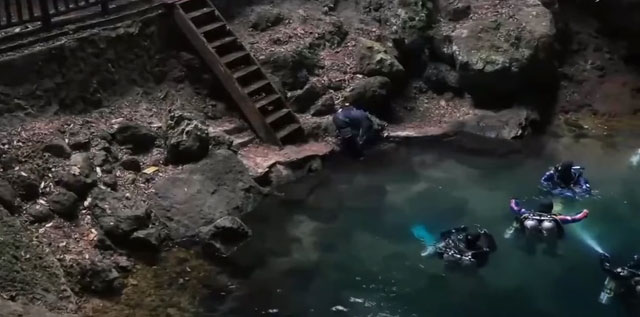The account of the elderly woman in the village has unveiled a dark history lying beneath the crystal-clear waters.
Mai Châu City (Guangdong, China) is home to a natural water cave famous for its emerald-green color, known as the “dragon palace” on Earth – Lujia Lake.
With breathtaking scenery and water as clear as jade, Lujia Lake is also the only completely submerged cave in China. This unique feature not only attracts a large number of tourists but also renowned professional divers.
The Skeletons Beneath Lujia Lake
In November 2011, a group of individuals ventured to Lujia Lake to challenge themselves by diving to the bottom to see how deep the water was.
However, this attempt revealed a shocking secret lying deep beneath the surface. During their dive, the group discovered numerous skeletons. Terrified, the divers immediately surfaced and reported to the police.


The natural lake famous for its emerald-green color.
The police arrived at the scene and invited professional divers to assist in gathering information and images from the lake’s bottom. Through examination, authorities confirmed that there were 12 female skeletons found at a depth of 46 meters.
Forensic experts indicated that these individuals had drowned in Lujia Lake and had struggled violently before their deaths. Surrounding the skeletons were many long, heavy chains. This was the reason their struggles were in vain.
According to preliminary assessments, experts concluded that these women had died a long time ago and were not from modern times.
The police invited archaeologists to join the investigation. The results were astonishing. The female skeletons beneath Lujia Lake belonged to women who lived during the late Qing Dynasty.
Determining the truth based solely on bones was challenging, so experts began investigating the surrounding villages. Indeed, they found an 86-year-old woman living nearby. Her account helped experts and police unveil the dark history lying beneath the crystal-clear waters of Lujia Lake.
Revealing Secrets of Ancient Punishments
The elderly woman recounted that during the late Qing Dynasty, there was a prominent Li family in the area. This family held significant influence locally.
The skeletons at the bottom of Lujia Lake were women from the Li family, all accused of the crime of “not maintaining chastity.” In ancient times, chastity was of utmost importance to women. At that time, women had no status and were entirely dependent on their husbands after marriage. If their husbands died, they were expected to remain chaste for life. According to ancient beliefs, maintaining chastity was synonymous with preserving purity and moral integrity; women were expected to be wholly loyal to their husbands.


Divers discover many skeletons at the bottom of Lujia Lake.
If a woman failed to maintain her chastity and was discovered, she would be confined in a pig cage, then tightly bound with iron chains to prevent escape. Villagers would gather to insult her before throwing the cage into the water.
“Drowning in a pig cage” was a form of execution used by families or villages to punish unfaithful couples. However, the victims were typically women.
Influenced by the patriarchal mindset, men could take concubines, but widows were expected to remain chaste for life. If a widow was found to be unfaithful, she would certainly face the death penalty, while men would only face a few criticisms.
In reality, this punishment did not necessarily have to use a pig cage; other types of cages or pens, such as chicken coops, could also be employed. The punishment of “drowning in a pig cage” carried another layer of meaning, suggesting that women who failed to maintain their chastity had lost all dignity and character.
This was one of the most cruel and inhumane punishments inflicted on the fates of women. At that time, the authorities could not intervene, believing it was “a family matter.” Moreover, the women who were punished were often dealt with in secret. On the other hand, the Qing government only “took care of their own affairs” and “had enough trouble of their own without worrying about others.”
According to the 86-year-old woman, Lujia Lake was a place of punishment for the Li family in the Yantian village and surrounding areas, specializing in executing individuals who violated laws and women who failed to uphold moral standards.
The punishment of confinement in a pig cage followed by drowning was indeed brutal and was only abolished during the Republic of China period.


















































